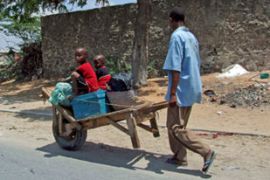Somalis flee Mogadishu offensive
Interim government warns residents to leave their homes after four days of fighting.

Ethiopian forces arrived in Somalia in December last year to help the UN-backed interim government force out the Union of Islamic Courts which had taken control of much of south and central Somalia.
Burying the dead
Abuka Albadri, a local journalist, told Al Jazeera that the ceasefire negotiated between the Ethiopian forces and clan leaders was still in place across the city.
| Your Views |
|
“The situation is Somalia has gone from bad to worse after the intervention of Ethiopian troops” Abed, Kumasi, Ghana |
“It is a chance for the people to bury the dead bodies and take the wounded to the hospitals,” he said.
But Albardi added that the transitional government was moving its forces around the capital ahead of the planned military offensive.
Salad Ali Jelle, Somalia’s deputy defence minister, said the government did not recognise the truce.
He insisted that the government had been fighting “terrorists” for the past four days, not clan militias.
Thousands displaced
Hundreds of residents of Mogadishu took the opportunity to flee the city early on Monday.
“Last night was the first night I have slept since the war started,” a clan militia fighter told Reuters news agency on Monday.
The United Nations refugee agency says about 10,000 people have left over the past three days alone, bringing the total number of displaced to nearly 100,000 since February.
Most of them have gone to the Lower Shabelle region south of Mogadishu, the UNHCR said.
“With internally displaced people begging on the streets, sleeping without shade and suffering from diarrhoea, people are forced to make their way further and further from Mogadishu, due to dwindling resources and deteriorating conditions,” it said.
Landmine blast
Despite the reported ceasefire, a landmine exploded in southern Mogadishu as a government convoy carrying general Abdullahi Ali Omar, the commander of Somalia’s army, passed.
He was unhurt in the blast, which the interim government blamed on al-Qaeda.
“An al-Qaeda cell was behind the explosion. They want to kill key government officials. They want to do here what they are doing in Iraq,” Hussein Mohamoud Hussein, Somali presidential spokesman, said.
Also on Monday, two men and two women were shot by Ethiopian troops while crossing a street in Ali Kamin, where Ethiopian soldiers and tanks were holding their positions, witnesses said.
Somali reporters say they have seen scores of dead lying in the streets, while Ethiopia says it has killed 200 insurgents.
Residents say they believe several hundred people – mainly civilians – have died.